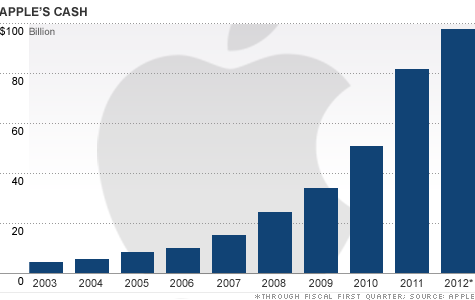Veteran and well-known economic forecaster Nouriel Roubini said in July of 2011 that the United States economy is headed for a “perfect storm” in 2013. I think we are already in a “perfect storm” in the United States economy, though the optimist within me wants to believe that we are at the tail end of the storm. When people use the phrase “Perfect Storm,” it seems as though they sometimes forget the “storm” part of that phrase, and the fact that in the movie of the same name, nearly everyone died. But it has definitely been a storm. The factors that combine to create the “perfect storm” in the U.S. economy are: the lagging economy, consumer confidence, disagreement over how large government should be and how to solve this disagreement, high unemployment and the tendency by government and business to contribute to it.
The U.S. economy continues to lag, with consumer confidence still shaky, but perhaps making a comeback. See chart below. In order to stimulate the economy, people and companies need to be spending money. This generally happens when confidence is high.

Americans desire services that typically only governments provide, such as schools, roads, clean water, social security, health care for seniors and national defense, but they don’t want to pay for them. Any discussion about an increase in tax revenue or rate increases by a politician or government organization is instantly dismissed by large numbers of the voting public whenever possible. This has happened on many occasions in cities, counties and states across the country. When there are discussions about reducing government, this is met with a similar enthusiastic opposition.
Whether one philosophically agrees with the size of the government as it stands right now or not, it is what it is. We have gotten where we are and it takes time and leadership to make a change one way or another. However, doing nothing at this time will not fix the situation. Governments either need more money to pay for the services that the public expects, or they need to make hard decisions to cut services to the point where the budget can cover what remains.
It strikes me that there is an opportunity here to educate the public on what is costs to provide the services that they want. How many years in a row do we have to cut school budgets in California, for instance, before people have finally had enough? Is this how we really want the trend in education to continue? Does anyone really think that by continuing to cut education budgets, somehow their children will receive a better education, and not a worse one?
The final component in the structure of my “perfect storm” is that it seems that at a time when unemployment is very high in this country, government agencies and businesses focus their cost-reduction efforts on reducing labor, leading to the vicious cycle we see in the unemployment figures. Technology and the availability of cheap labor in other countries around the world allow corporations to replace American workers. At this point, I should also remind the readers that corporate savings accounts are at all-time highs. Corporations, including banks of all size, are saving money, and not hiring people or making loans to small businesses, even when there is sufficient equity or profit potential in the deal.
It is my sincere hope that we are at the tail end of one aspect of the “perfect storm,” that being the economy and consumer confidence. The other factors that remain, and will make it difficult to steer out of this storm, must be addressed using real leadership, compromise, intelligence, and in the interest of the well-being of the people of this country. The country cannot come out of this storm quickly if the focus is on individual gain or shareholder profits at the expense of the people.



